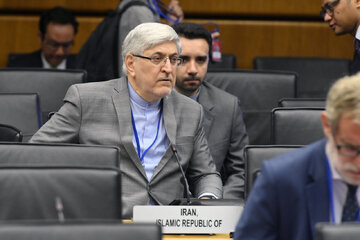JCPOA resumption depends on Western action: Iran

TEHRAN- During the quarterly meeting of the Council of Governors, Iran’s envoy to the International Atomic Energy Agency (IAEA) highlighted that the resumption of the Joint Comprehensive Plan of Action (JCPOA) implementation hinges on specific actions from the United States and the European Troika.
Mohsen Naziri Asal elaborated on the Vienna negotiations, emphasizing that Iran and other JCPOA members engaged in discussions after the United States expressed willingness to return to the nuclear deal and lift unlawful sanctions. The negotiations aimed to establish conditions for the U.S. to rejoin the JCPOA and fulfill its obligations.
Naziri Asal noted the protracted nature of the negotiations, attributing the lack of progress primarily to the United States' apparent lack of political will and determination.
He expressed concern over some participants ignoring the irresponsible behavior of the U.S., suggesting that narrow political agendas supersede efforts to revive the JCPOA.
Highlighting Iran's earnest participation in the Vienna talks and its readiness to finalize the agreement, Naziri criticized the Western parties for their inconsistent stance. He emphasized the international community's expectation of tangible actions rather than mere political statements from the U.S. and the E3.
Despite Iran's readiness to comply with JCPOA obligations, Naziri Asal pointed out the ambiguity surrounding the Western parties' position, indicating their reluctance to adhere to the agreement's terms.
The negotiations, held in eight rounds in Vienna with the involvement of the 4+1 Group, the European Union, and Iran, were hindered by factors such as contradictory behavior, decision-making delays, extravagance, and new demands from the U.S.
The envoy underscored the White House's apparent lack of resolve to return to the JCPOA, contrasting it with Iran's consistent stance in seeking a stable and reliable agreement that guarantees the lifting of sanctions without future leverage against Iran.
President Ebrahim Raisi, also affirmed Iran's willingness to continue negotiations if the West corrects its behavior towards Iran, suggesting a path forward.
The Joint Comprehensive Plan of Action (JCPOA) agreement ensures that Iran’s nuclear programme will be exclusively peaceful. It lays down the timeline and arrangements for the lifting of nuclear-related sanctions against Iran.
The UN Security Council endorsed the JCPOA through Resolution 2231 (2015) on 20 July 2015. On 31 July the Council of the EU adopted the legal acts transposing the first of these provisions into EU law.
On 18 October, 90 days after UN Security Council resolution 2231 (2015), the JCPOA came into effect.
The JCPOA participants made the necessary arrangements and preparations for the implementation of their JCPOA commitments.
The EU adopted legal acts providing for the lifting of all nuclear-related economic and financial EU sanctions as specified in the JCPOA, taking effect as of implementation day, simultaneously with the IAEA-verified implementation by Iran of agreed nuclear-related measures.
Leave a Comment